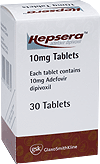| Baseline
CD4 Cell Count Predicts HBV DNA Decline in HIV Negative and HIV Positive Patients
Treated with Adefovir (Hepsera) By
Liz Highleyman  CD4
T-cells play a key role in response to many pathogens, but their contribution
to fighting hepatitis B virus (HBV) are not
fully understood. CD4
T-cells play a key role in response to many pathogens, but their contribution
to fighting hepatitis B virus (HBV) are not
fully understood.
In
a study presented at the recent 59th Annual Meeting of
the American Association for the Study of Liver Diseases (AASLD 2008) in San
Francisco, researchers looked at the influence of CD4 cell count on HBV viral
load decline during treatment with adefovir
(Hepsera).
Coinfection with
HIV and HBV substantially alters the natural course of HBV infection, as well
as its management, the investigators noted as background. Directly targeted anti-HBV
agents -- including adefovir,
lamivudine (Epivir-HBV), entecavir
(Baraclude), telbivudine (Tyzeka),
and tenofovir (Viread) -- effectively
suppress HBV DNA, but the kinetics of viral decline and the factors that predict
it have not yet been clearly established.
In the present double-blind,
randomized study, the researchers evaluated HBV viral kinetics during adefovir
therapy in lamivudine-resistant HIV positive (n=12) and HIV negative (n=5) chronic
hepatitis B patients. All 5 HIV negative participants received adefovir, while
the HIV-HBV coinfected patients were randomly assigned to receive either adefovir
(n=8) or placebo (n=4) for a total of 48 weeks. After 48 weeks, all participants
received open-label adefovir for an additional 48 weeks.
HBV and HIV viral
loads were measured on days 0, 1, 3, 5, 7, 10, 14, and 28, and then every 4 weeks.
Immune profiles, liver chemistry, and laboratory safety evaluations were performed
at baseline and on an ongoing basis after starting treatment.
Results
•
HIV-HBV coinfected patients receiving
adefovir demonstrated a significantly lower decline in HBV DNA compared with HBV
monoinfected patients:
•
Week 4: median -2.54 vs -3.52
log (P < 0.03);
•
End of treatment: median -5.37
vs -7.00 log (P < 0.03).
•
Adefovir pharmacokinetics was
similar in the HIV positive and HIV negative groups (P > 0.5).
•
Baseline CD4 cell counts correlated
positively with the second-slope decline of HBV in all patients (R = 0.8; P <
0.001), particularly coinfected individuals (R = 0.65; P < 0.05).
•
HIV-HBV coinfected patients with
a CD4 count < 600 cells/mm3 had a much smaller HBV viral load decline than
those with > 600 cells/mm3 (P < 0.05).
Based
on these findings, the investigators concluded, "HIV coinfection status is
associated with lower HBV viral response rates to adefovir."
"Baseline
CD4+ T-cell count is an independent predictor of HBV decline in both HIV positive
and HIV negative subjects, emphasizing the role of immune status on clearance
of HBV-infected hepatocytes," they continued.
However, they added,
"the pharmacokinetics of adefovir was not affected by HIV serostatus and
did not predict HBV viral response in [either] HIV negative [or] HIV positive
subjects."
The researchers said they plan to conduct future studies
focused on evaluating the relationship between baseline CD4 T-cell count and long-term
HBV suppression.
12/5/08
Reference
E Formentini, AU Neumann,
MG Ghany, and others. Baseline CD4+ T Cell Count Predicts HBV Decline in HIV Negative
and Positive and Patients Treated with Adefovir Dipivoxil. 59th Annual Meeting
of the American Association for the Study of Liver Diseases (AASLD 2008). San
Francisco. October 31-November 4, 2008. Abstract 954. |

![]()
 CD4
T-cells play a key role in response to many pathogens, but their contribution
to fighting
CD4
T-cells play a key role in response to many pathogens, but their contribution
to fighting